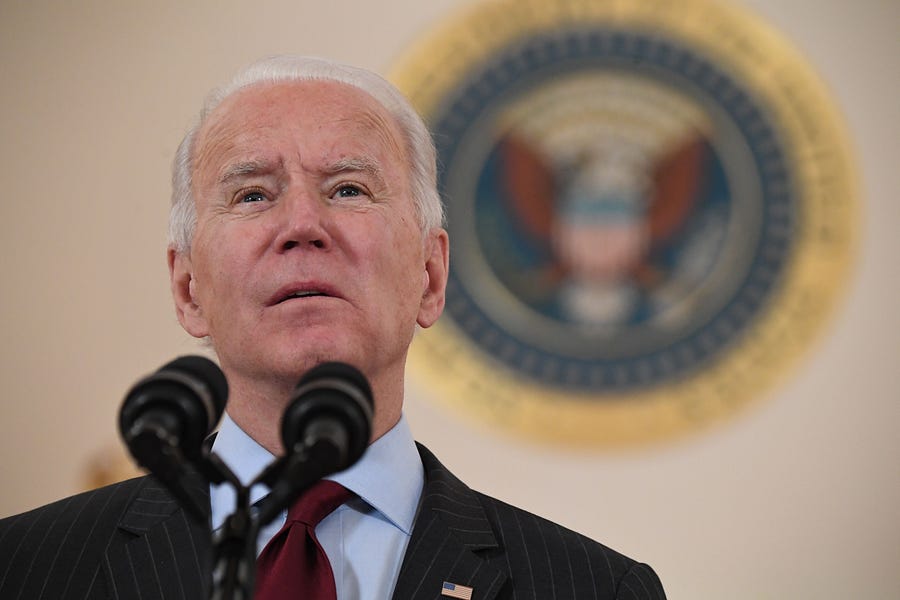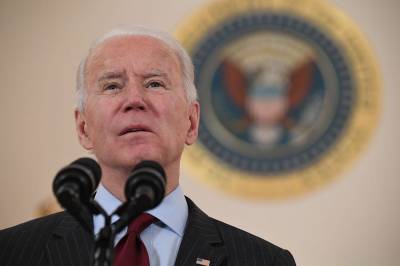President Biden’s honeymoon keeps getting sweeter. The economy is picking up steam, as is public optimism about the coronavirus pandemic, helping the 46th president to an approval rating of nearly 60 percent in the latest Pew Research poll as he approaches the end of April and his 100th day in office.
Even better for Biden, Republicans are paralyzed by internal divisions and clinging to the idea of a restoration for former President Donald Trump. That hope/fear means that on the issues where the GOP managed to present a united front against the new Obama administration 12 years ago, there is now a great deal of sheepish silence. Since much of what Biden is doing on deficit-fueled stimulus, infrastructure spending, and the withdrawal of U.S. forces abroad represents a continuation of Trump policies, Republicans are in poor shape to oppose him. Given the new GOP obsession with being the party of labor and scourge of capital, the nationalists may end up hitting Biden for not going far enough to expand government power to punish companies.
But it’s not all breakfast in bed and liquid lunches for Biden & Co. on this honeymoon. Last week, the left wing of his party quickly backed him down on that hardest of all domestic policy issues: immigration.
In a classic Friday news dump, Biden entered an executive order that would have maintained through September rock-bottom Trump administration caps on refugee resettlement. In February, Biden had promised to increase the number of refugees granted asylum in the U.S. from the current 15,000 per year by more than fourfold. The response from immigration activists was so sharp that Biden reversed himself the next day. But he muffed the mulligan, too—blaming the staffing demands caused by the “crisis” at the southern border for causing the delay. His administration had been laboriously avoiding that word. Not only for the obvious reason that “crisis” would reinforce the idea of the White House overwhelmed by the flood of migrant children, but also because a “crisis” implies such migration is inherently a negative thing—a no-no on the pro-immigration left.
While Biden has so far gotten cover from congressional Democrats in his efforts to stem the tide of illegal border crossings, he’s got a serious problem with expectations among many activists in his own party. House Democrats have broken up Biden’s proposal for a comprehensive immigration deal of the kind that eluded Trump, Obama and George W. Bush, and are already pushing through party-line bills to loosen existing restrictions—and that’s just the opening bid. The strength of the backlash against Biden’s refugee status quo order on Friday and the speed with which he caved makes clear the divergent goals of the White House and many on his party’s left—and the distrust between them. Republicans and immigration activists are both excited about what they see as the inevitable showdown between the two camps.
But what much of the analysis misses is where the real pressure points are—as was the case when the political press badly underestimated Biden’s own chances to win the Democratic nomination last year. Democrats generally aren’t nearly as supportive of “open borders” as either Republicans claim or activists hope.
A new Dallas Morning News survey finds that just 62 percent of Texas Democrats approve of the way Biden is handling immigration at the U.S.-Mexico border—pretty low in a state where Biden is riding at 91 percent job approval among members of his own party. It’s hard to say exactly what accounts for the gap and which policies Lone Star State Dems would rather Biden follow. But here’s one clue: In the same poll, 30 percent of Texas Democrats said they think a border wall is necessary.
Nor is this just border-state Democrats. Prior to the rise of Trump, which created such strong partisan pressures on the issue, big chunks of the Democratic Party were in favor of immigration restrictions—even large-scale deportations. A national survey in February 2014 asked voters about the increasing rate of deportations under the Obama administration. While it’s true that a bare majority of Democrats said more deportations were a “bad thing,” 37 percent—including a third of self-described liberals—said it was a good thing to deport more illegal immigrants. The same new Pew survey that shows such rosy marks for Biden overall also shows those sentiments may be returning now that Trump is gone. The share of Democrats who say illegal immigration is a “very big problem” has nearly doubled in the past year from 15 percent to 29 percent.
This helps us understand how Biden last month managed to score a lower approval rating on his handling immigration in a Marist College/PBS News poll last month than Trump did in the second year of his sole term—it was 38 percent for Trump, 34 percent for Biden. While Biden got passing marks from black voters, he broke even with Hispanic voters and was underwater on the issue with every subsection of white voters other than the most liberal group, college-educated white women. Among majority-making independents, Biden was underwater by 26 points.
The best way to understand the politics of immigration restriction is as a traditionally Democratic issue, especially among pro-union voters. Trump brutally exploited the Democrats’ inability to reconcile the longstanding demands from core groups in their coalition for tight limits on immigrant labor with the party’s bet on demographic determinism and the rise of Hispanic voters. While Republicans will certainly hold on to Trump’s populist appeals on immigration, that doesn’t mean Biden won’t nudge his party back toward its labor roots. There’s a reason Obama ended up as the “deporter in chief,” and why Biden is testing his limits on the subject. That’s where the votes are.







Please note that we at The Dispatch hold ourselves, our work, and our commenters to a higher standard than other places on the internet. We welcome comments that foster genuine debate or discussion—including comments critical of us or our work—but responses that include ad hominem attacks on fellow Dispatch members or are intended to stoke fear and anger may be moderated.
With your membership, you only have the ability to comment on The Morning Dispatch articles. Consider upgrading to join the conversation everywhere.